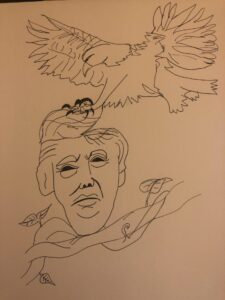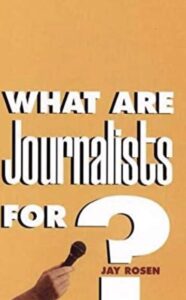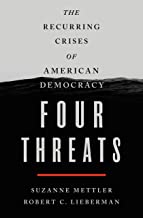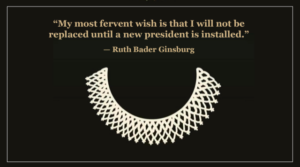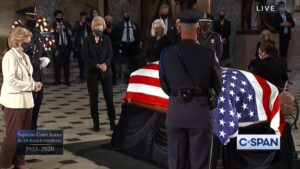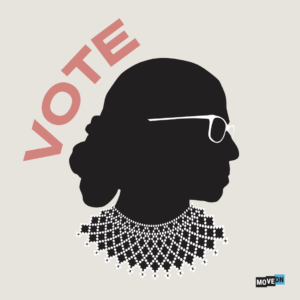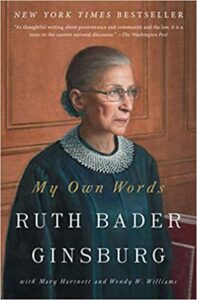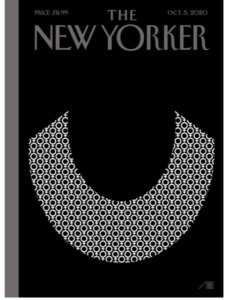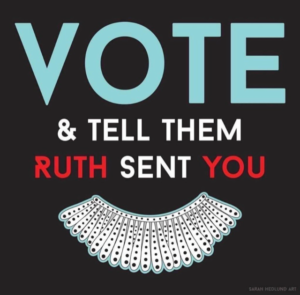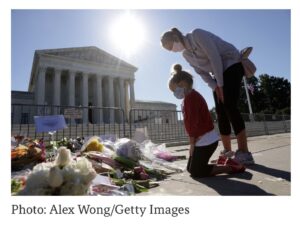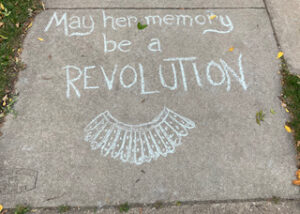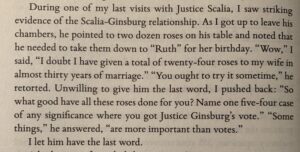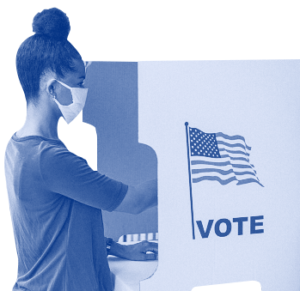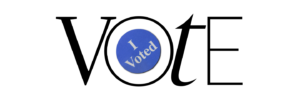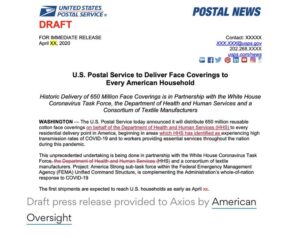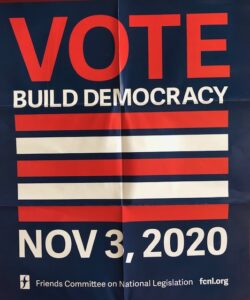Our country’s soul runs deep.
September 30, 2020He will watch as his towers crumble to the ground and we melt down the gold-tinted glass and steel to create a gorgeous bridge across our southern border. His golf courses will be transformed into highly diversified ecosystems where sophisticated natural reciprocity, not small men, reign. Everything he built his personal brand around–unlimited wealth and toxic masculinity and an anemic sort of freedom defined by individualism–will become compost for the new world we grow. His worldview will become so archaic as to be understood as the twisted mythology that it is.
-Courtney Martin, author and activist
[“Weird drawing I did while listening to the “debate” last night.” -Courtney]
https://www.courtneyemartin.com
“Some Pain is simply the normal grief of human existence. That is pain I try to make room for. I honor my grief.”
-Marianne Williamson
“What happens next depends on each one of us…and all of us together.”
-Upswell/Fetzer Institute
“Doesn’t everything die at last, and too soon?”
-Mary Oliver
“Stop grumbling among yourselves.”
-Gospel of John 6:43
“No miracles, please.
Just let your laws
become clearer
from generation to generation.”
-Rilke
“We can only consider things so long. After a while, all the information…all the options and opinions…will begin to weight us down. After our deeper eyes have seen the situation, all the well-meaning voices telling us what we should or should not do will start to feel like strings we can’t cut through.
The only way to know what awaits us is to live it.”
-Mark Nepo
This morning, finding peace in the chaos, calm in the inevitable. We will get through the pain and suffering the next few months politically and socially, and many more for COVID. Our country’s spirit runs deep. We know it will be painful and frightening. Yet, as Courtney Martin writes, all of this will become ‘compost for the new world we grow.’ We choose now, in this moment, how, and what, we want to grow.
-dayle
❀
…search for reason and truth.
September 29, 2020“Where-ever
law
ends,
tyranny
begins.”
-John Locke, 1689
Fundamentally Different Journalism
I recently wrote that the United States is not a democracy, but an autocracy in the making.
That calls for a fundamentally different kind of journalism. And who better to show us what this looks like than Jay Rosen, one of the sharpest critics of modern news.
In the run-up to the US elections in November, Jay answers an essential question: How should the media report on a democracy in crisis?
“There are things that journalists can – and should – be legitimately for: a citizens agenda; fighting authoritarianism and the subversion of democracy; an evidence-based political debate; and pro-participation.”
Agree with Jay Rosen’s take on the ‘Peter Baker’ form of journalism: “I don’t trust this attitude. I think it is dismissive of some of the hardest problems in journalism. […] These are fantasies of detachment.” (para. 14 *) -dayle
JOURNALISTS: YOU NEED AN AGENDA, FOR ALL OF US
JAY ROSEN
‘I am not sure how long I’m going to be doing this.
By “this” I mean critiquing the US press as it reports on national politics, and trying to get journalists to adopt better practices when they are public actors who present to us as observers. It is a frustrating assignment, and I am wary of burnout.
But since I am self-assigned – self-appointed, really – I have freedom of movement, intellectually speaking. Were it not for the fact that we are all enmeshed in the biggest national emergency since the Great Depression, I would probably have exited by now from the “press coverage of politics” beat, in the belief that I have contributed what I can, worn out my welcome, and exhausted the patience of anyone who has been following along.
But I cannot quit before the 2020 elections are run. Until then I am going to press my case as hard as I can. Today, my case to journalists covering the US election, whether they’re US American or not, is this: you cannot keep from getting swept up in Donald Trump’s agenda without a firm grasp on your own.
I am quite aware that journalists are taught not to let their political preferences, party membership, or personal ideology shape their reporting, and I have no quarrel with that restriction. But it does not end the discussion.
Here is journalist and show host Jake Tapper on CNN in May of 2016, after Trump claimed – without evidence – that the father of former presidential candidate Ted Cruz had met with Lee Harvey Oswald, the man who shot president John F Kennedy in 1963. (Italics mine.)
“There is no corroborated evidence that Ted Cruz’s father ever met Lee Harvey Oswald, or, for that matter, any other presidential assassin. We in the media don’t talk about it because there’s no evidence of it. In fact, there is contrary evidence. Well before the picture was taken, Rafael Cruz’s sister was brutally beaten by Castro forces and Rafael Cruz had denounced the regime. So, any suggestion that Cruz’s father played a role in the Kennedy assassination is ridiculous and, frankly, shameful. Now, that’s not an anti-Trump position or a pro-Cruz position. It’s a pro-truth position.”
There are fundamental values journalists have to stand up for
Jake Tapper knows that journalists are not supposed to push an agenda like “Ted Cruz for president!” But he also knows there are fundamental values that he and his colleagues in the news business have to stand up for. Among these are a decent respect for truth-telling in public settings. When politicians competing for votes float poisonous charges without even a modicum of evidence, self-respecting journalists have to push back in some way.
In doing that, Tapper wasn’t crossing the border from journalism into some other line of work. He was practising his craft the way he understands it – and legitimately so. The distinction he makes is important. Yes, he took a position on air, but it’s not anti-Trump or pro-Cruz. It’s pro-truth.
Now I want to go beyond what Jake Tapper said in 2016, and introduce a distinction of my own, between the political and the politicised. About press coverage of politics, nothing would improve our conversation more than a careful separation of these two terms. Not easy, but worth trying. Here is what I mean.
When TV journalists with news shows push back against major party candidates who are floating poisonous charges without evidence, that is a political act. We should be clear-eyed in acknowledging such. Same goes for the newspaper fact checkers who wrote, “Trump is once again making a ridiculous claim.” With these moves journalists are trying to alert viewers and voters to be wary of Trump’s false charges. They would not put it this way, but I will: their implicit “agenda” is to prevent lying from being raised to a universal principle in politics.
When politicians competing for votes float poisonous charges without even a modicum of evidence, self-respecting journalists have to push back in some way
That is a valid goal. When I call it a political act, I mean several things: it is undertaken for the good of the nation. It is a use of power in one sense, a check on power in another. It is constitutionally protected. And it is contestable. People can and do disagree about the propriety of journalists declaring what is true and what is false, what is in or out of bounds during an election, and they argue about the calls made. All these make it (properly) political.
But – and here comes my distinction – if journalists lose their place and operate as cheerleaders for individual candidates (“Ted Cruz for president!”) or they let their ideology distort their reporting so as not to injure a cause they manifestly believe in, then their work has been unduly politicised. This is not good. It erodes trust, validates bad faith attacks on the press, and ultimately renders journalism useless as a check on power because it is trying to be the power.
Where does the properly political part of journalism end?
*So we should be leery of an overly politicised press. We should also watch out for politicised attacks on the press. And we should be wary of journalists who don’t think their work is political at all. Here is Peter Baker, White House correspondent of The New York Times:
“As reporters, our job is to observe, not participate, and so to that end, I don’t belong to any political party, I don’t belong to any non-journalism organisation, I don’t support any candidate, I don’t give money to interest groups and I don’t vote.
I try hard not to take strong positions on public issues even in private, much to the frustration of friends and family. For me, it’s easier to stay out of the fray if I never make up my mind, even in the privacy of the kitchen or the voting booth, that one candidate is better than another, that one side is right and the other wrong.”
When the president is using you as a hate object in order to discredit the entire mainstream press, what good is ‘our job is to observe, not participate’?
I don’t trust this attitude. I think it is dismissive of some of the hardest problems in journalism. Correct in warning against an overly politicised press, it has nothing to say about the inescapably political nature of Baker’s day-to-day work. Not voting on principle, never making up your mind on tough issues, deliberately frustrating friends and family when they ask around your kitchen island: what do you think? These are fantasies of detachment.
When the president is using you as a hate object in order to discredit the entire mainstream press in the eyes of his supporters so that your reporting and the reporting of all the people you compete with arrives pre-rejected, what good is “our job is to observe, not participate”? You are part of that system whether you like it or not. You either think your way out of it, or get incorporated into it.
The hard work is deciding where the properly political part of journalism ends, and its undue, unfair, unwise and risky politicisation begins. But we don’t have a discussion like that. Instead, we have media bias wielded like a baseball bat, and journalists who think they can serve the electorate better if they remove themselves from it.
How should journalists approach the 2020 election?
Now we are met on an ugly and brutal battlefield: the 2020 campaign for president. How should journalists approach it? You can’t keep from getting swept up in Trump’s agenda without a firm grasp on your own. But what should that agenda be? To this tricky question I now turn, armed with my distinction between the properly political and the overly politicised.
I am going to list a few things I think journalists can legitimately be “for” as they report on the coming election. If they choose not to choose, and head into the 2020 campaign without stars to steer by, they are likely to become lost in Trump’s predictable flood of newsy distractions and lurid controversies. They know what’s coming. What they don’t know is how to avoid playing along.
Here are some suggestions.
1. A citizens agenda
This I have described many times, and I am working with a group that is advocating for it in 2020. It’s an alternative to the horse race model for election coverage. There, the organising principle is: “Who’s likely to win?” In the citizens agenda style, you start by asking the people you are trying to inform: what do you want the candidates to be talking about as they compete for votes? If you keep asking that question, and listen carefully to the answers, you can synthesise from them a kind of priority list that originates with the voters.
This list then becomes your “agenda” for covering the campaign. Get the candidates to address what the voters said they most want to hear about. Focus your journalism around key items on the citizens agenda. When one of Trump’s media storms blows in you can hold fast to your own priorities by asking if his latest controversy advances discussion of the citizens agenda. If not, you have good reason for downplaying it.
Because it pressures the candidates to address these issues rather than those, the citizens agenda is a political project. But it can be done without unduly politicising election coverage if the act of listening to voters is a genuine one. The agenda comes from them, not from the newsroom’s political preferences.
I have been recommending this approach for many years. I wrote about it in my 1999 book, What Are Journalists For? The basic model has been around since the early 1990s. If journalists in the national press wanted to move toward this alternative they would have done so by now. My read is that it feels too earnest to them, too much like civics class, or “eat your vegetables” journalism, not enough like having drinks with political insiders. I still think it’s the best way to keep from getting swept up in Trump’s agenda. But they do not. So we need other ideas.
2. Fighting authoritarianism and the subversion of democracy
Suppose you began with a frank recognition among editors, producers and reporters that democracy is at risk in the United States. (News flash: it is.) This would argue for extra emphasis on the integrity of elections, extra vigilance against those who would try to subvert them, and a special watchfulness for – a duty to warn about – authoritarian movements in the body politic: demonisation of minorities, trashing of democratic procedures, evasion of checks and balances, erosion of accountability, threats of violence, and other forms of above-the-law behaviour. (For what I mean by watchfulness, see this post by Dan Froomkin, “When Trump takes a step toward autocracy, journalists need to call it out”. For a “fighting voter suppression” agenda see this project.)
The extra watchfulness I speak of is a small-d democratic act. It has to be applied across the board: left, right, centre, fringe. With that condition,
it is entirely within journalists’ rights to make fighting authoritarianism the mission and heart of their campaign coverage. Call it threats-to-democracy journalism. If we were ever going to need an agenda like that, this is the year.
3. A more evidence-based political debate
Journalists could also decide to stand more forcefully and consistently for an evidence-based politics. If they did, this too would be a political act. But again, it does not have to be politicised. Asking “is this evidence-based?” could be a way of deciding whether a campaign controversy is worth discussing – or dismissing. Holding all candidates to the same standards of evidence is the very essence of across-the-board fairness. Rating the campaigns on how evidence-based they are willing to be might prove especially useful in a political environment dominated by our struggle with Covid-19.
Imagine asking the best public health and immunology experts you can find, “When it comes to the pandemic, what do you want the candidates to be talking about as they compete for votes?” Filtered through community knowledge and common sense, this might be a good way of organising state and local coverage of candidates who will have to speak about recovering from the virus to get elected. “We are going to be relentlessly evidence-based, because that is what our community most needs to get out of this mess … ” is a solid agenda to adopt in an election year likely to be dominated by a public health crisis.
4. Pro-participation
Democracy is not a spectator sport, though some forms of punditry seem to frame it that way. The more people who participate in the system the stronger the system is. Journalists can design their coverage so that it helps people go out and vote. With good information and timely notice, they can make it easier for eligible voters to get registered and exercise their rights. They can expose those who would discourage citizens from voting. They can fight disinformation that tries to depress turnout. They can hold accountable the public officials who run elections. They can warn about problems that could haunt us on election day.
But it’s not just voting. All forms of participation could be part of this agenda: how to volunteer, how to contribute, where to see the candidates.
No way around it: encouraging participation is a political act. But as long as it includes all parties and all voters, election coverage that is shamelessly pro-participation does not unfairly politicise the press. Bad actors will of course make that charge, but bad actors always complain about good journalism.
Don’t like these ideas? Come up with your own!
Some I didn’t get to: fighting cynicism. Making politics fun again. Bringing emotions other than rage to campaign coverage. Transcending traditional party divisions. It would take courage and imagination, but all of these could work as organising principles, possibly in combination with others I have mentioned. (You don’t have to have one and only one agenda!)
My point is that journalists need to know what they’re trying to accomplish with their election coverage.
Covering the campaign the way campaigns in the US are covered – which, as far as I can tell, is the current “agenda” at CBS, NBC, ABC, CNN, PBS, NPR – does not provide a sense of mission strong enough to prevent a repeat of the debacle in 2016. Nor does vowing not to make the same mistakes. Something stronger is required.
They know what’s coming, I said about the campaign press. What they don’t know is how to avoid capture. Donald Trump is going to campaign the same way he “governs”. By flooding the zone with shit, and making so much news that no single revelation matters much. By accusing opponents of the very things he is manifestly guilty of.
By giving his supporters license to reject the news: “What you’re seeing and what you’re reading is not what’s happening.” By persuading the uncommitted that it’s useless to pay attention because you will never get the story straight. By leveraging his weirdness as a human being, like the fact that he lacks the gene for feeling shame. By lowering all of us. By manufacturing confusion. By calling himself the victim of journalists who point these things out. By warring against the press.
These methods – but they’re not methodical, just compulsive – exploit errors in the journalist’s code. Among them are:
- What the president says is news.
- Issues are boring. Controversy is good.
- Conflict makes news, attacks are exciting.
- Doesn’t matter if it’s true. If it could become a factor in the election, it’s worth reporting.
- In theory, sources that flood the zone with shit should be dropped. In practice, we need them.
- More information is better than less.
- Meeting traffic goals means you’re winning at this.
These are propositions set too deep. There is zero chance of removing them in time for 2020. Each one opens the press to manipulation by Trump and his campaign. Which is part of why I say: you can’t keep from getting sucked into his agenda without a firm grasp on your own. Only a strong sense of mission will prevent a repeat of 2016. But I am not optimistic. It is so much easier to go with the flow.’
This article was originally published on Jay Rosen’s blog, PressThink.
Ammas & Abbas
“There was always just enough virtue in this republic to save it; sometimes none to spare, but still enough to meet the emergency.”
—Sec. of State William Seward during the Civil War
Fr Richard Rohr, Center for Action & Contemplation:
The desert ascetics’ [ammas and abbas] relationships were nonpossessive: They cared for others while leaving them free. Concern for reputation was discarded. Feelings were acknowledged and listened to for their wisdom but were subjected to the discipline of the heart’s goal to seek God. The desert ascetics sought to mortify disordered passions that distracted them from their deepening relationship with God..Gaia…the Universe.
Thomas Merton:
These were people who believed that to let oneself drift along, passively accepting the tenets and values of what they knew as society, was purely and simply a disaster. -The Wisdom of the Desert
Bede Griffiths:
One of the greatest needs of humanity today is to transcend the cultural limitations of the great religions and to find a wisdom, a philosophy, which can reconcile their differences and reveal the unity which underlies all their diversities.
Seth Godin:
Professional wrestling.
Professional wrestling isn’t about wrestling, of course. It’s about who’s up and who’s down. The stated rules are there to be broken by some of the participants, and it’s not professional in any useful sense related to the sport of wrestling.
And the metaphor is powerful in many areas of life.
But we can’t understand the metaphor without understanding the forms of status that are on offer.
There is the status of affiliation. This is about belonging, about knowing and living with the rules. It’s about weaving together the culture and this affiliation leads to a form of popularity.
And then there is the status of dominance. This is about winning at any cost, cheating and subjugating. It’s about unraveling the culture in service of just one aim–victory over the others.
Professional wrestling creates tension between the two forms of status. We know that we all benefit from affiliation, but often are swayed by the avenging dominator if we see ourselves in them.
The theater of status happens in our daily lives. It’s who sits where at the meeting, or who gets to announce that the Zoom session is over. It’s the insurgent and that the status quo.
It’s the dramatic back and forth between someone who seeks power and someone who is tired of being told what to do.
The successful affiliator doesn’t seek to out-dominate the dominator. Instead, affiliators weave together enough persistent community pressure to get things back on track.
And sooner or later, people realize that the triumph of the dominator, while it can be painful, is short-lived.
Story from Our Community:
Nearly every day since we started quarantine, I sit outside for my morning prayer time. As part of this, following reading the daily meditation, I play the “Prayer for Our Community” at the conclusion where Fr. Rohr reads the prayer. When he pauses after the words, “Listen to our hearts’ longings for the healing of our world,” I quietly bring those to the energy of the space: my parents, my students, those suffering with Covid, our country’s reckoning with its systemic racism, our climate emergency.
—Tess F.
George knew. Now we do, too.
September 26, 2020George Washington in his farewell address, Saturday, September 17, 1796:
“However [political parties] may now and then answer popular ends, they are likely in the course of time and things, to become potent engines, by which cunning, ambitious, and unprincipled men will be enabled to subvert the power of the people and to usurp for themselves the reins of government, destroying afterwards the very engines which have lifted them to unjust dominion.”
~
I’ve wanted to see this documentary since it premiered at the Sundance Film Festival in January, winning the U.S. Grand Jury Prize for Documentary. I’m grateful that I was finally able to stream it this evening, at the end of a week shrouded in deep despair after Ruth Bader Ginsberg’s untimely passing and a nomination to the Supreme Court that will mostly likely undue 50 years of RBG’s tireless human rights and gender rights pursuits. Boys State has given me a glimmer, a moment, of hope, showing a microcosm of our general great political process, and those young voices and minds who are poised, and want, to lead this country.
I don’t believe the United States is truly a democracy…not any more. Maybe what we’re trying to steer, and salvage, at this point is a fractured political process, once guided by a constitution that, although not guaranteeing protection, has given us a frame to serve the people…we the people…with accepted norms, practices, and behaviors of those we elected into office. Now, it’s seemingly only about power, and greed, and ‘winning’, at all costs.
Boys State is a documentary about a high-school civics conference where every year, more than 1,000 young men, age 16 or 17, meet at the Texas State Capitol to participate in a mock government. They section off into the Federalist and Nationalist parties to elect various political positions and vie for the highest position—governor.
Hope is not a word that comes easily to me now, yet this film shares, while holding a mirror to our divided country, a glimpse of hope, possibility, and passion for what America could once again aspire to be.
I suggest coupling the film with a podcast that gives explanation and history to where we’ve landed, detailing the risks…the perfect storm…we are facing in this national election.
-dayle
From host Ezra Klein at VOX:
‘The death of Ruth Bader Ginsburg, just weeks before a presidential election, leaves us in dangerous waters. It’s easy to imagine a scenario in which the election outcome is contested by one side and is ultimately determined by a Supreme Court with the deciding vote cast by Trump’s recent appointee. Indeed, both Sen. Ted Cruz and President Donald Trump have named this scenario as driving their urgency to replace Ginsburg. At that point, a legitimacy crisis looms.
Suzanne Mettler is the John L. Senior Professor of American Institutions at Cornell University. Her work has focused on trust between citizens and their governments, but recently, she’s co-written, with Robert Lieberman, a book that is tailor-made for this moment:
Its thesis is a dark one: America’s most dangerous political crises have been driven by four kinds of threat:
- political polarization
- democratic exclusion
- economic inequality
- executive power.
But this is the first time all four threats are present simultaneously.
“It may be tempting to think that we have weathered severe threats before and that the Constitution protected us,” they write. “But that would be a misreading of history, which instead reveals that democracy is indeed fragile, and that surviving threats to it is by no means guaranteed.”
We discuss where Ginsburg’s passing leaves us, what 2020 election scenarios we should be most worried about, what the tumultuous election of 1800 can teach us about today, how this moment could foster exactly the democratic reckoning this country needs, whether court packing and filibuster elimination will save American democracy or destroy it, when people know they’re benefiting from government programs and when they don’t, and more.’
[To listen, follow the link.]
One week ago today.
September 25, 2020‘We each can honor Ruth Bader Ginsburg by asking ourselves,
“What would Ruth do?”
Using this as a guide in our own lives will keep her with us. We can also honor what she said so recently: “My most fervent wish is that I will not be replaced until a new president is installed.”
The more we learn about her words and deeds, the more she will remain a force in our lives and the world around us. She left us a clear and precious legacy. It’s up to us to keep her spirit alive.’
-Gloria Steinem, author and feminine activist
“Justice Ruth Bader Ginsburg was a trailblazer. She was an icon. And to me, she was a role model and a friend. May her memory be a blessing.”
-Senator Elizabeth Warren
Vote early and in person.
September 24, 2020As DT visited the Supreme Court, crowds waiting to pay their respects to the late Justice Ruth Bader Ginsburg booed him, chanting “vote him out” and “honor her wish.” [NPR]
We will, Ruth. We will.
Ava DuVernay:
“Trump on trial.
With Justice Ginsburg presiding.”
Follow the link to learn how to vote in your state.
https://www.betterknowaballot.com
~~~
Healthy Voting helps you find healthy, secure, and safe ways to cast your ballot this year. Healthy voting practices protect yourself, your loved ones, and your community from the spread of COVID-19.
Your voting options depend on your state as well as deadlines for mail voting, early voting, and voting in-person on Election Day.
This site’s guidance is based on advice from leading public health experts as well as the latest updates to state election law. Healthy Voting focuses on statewide primary and general elections. [You can track your ballot online, too.]
~~~
Online Voting Wasn’t Ready for 2020. Don’t Count on It Anytime Soon.
- Rather than immediately trying to confront the difficult problem of end-to-end verifiability of online voting, the industry and researchers may instead focus on first developing and deploying end-to-end verifiable in-person and mail-in voting systems. Microsoft’s ElectionGuard is one such readily available open-source resource for end-to-end verifiable in-person elections. Working to deploy such software, and fielding similar solutions for mail-in ballots, offers a tangible path to improving election security.
https://www.lawfareblog.com/online-voting-wasnt-ready-2020-dont-count-it-anytime-soon
We can be one.
September 23, 2020“What I try to tell young people is that if you come together with a mission, and it’s grounded with love and a sense of community, you can make the impossible possible.” Congressman & Civil Rights Leader – Rep. John Lewis
‘We need to stand together so we can be one.’
V
O
T
E
Tell them Ruth and Rep. Lewis sent you.
Ruth’s Laws
“We are at last beginning to relegate to the history books the idea of the token woman,” Ruth Ginsburg said.
“Feminism [is the] notion that we should each be free to develop our own talents and not be held back by man made barriers,” Ginsburg said in her 2016 book “My Own Words.”
“Fight for the things that you care about, but do it in a way that will lead others to join you.”
1. Employers cannot discriminate against employees based on gender or reproductive choices.
ACLU Women’s Rights Project attorney Susan Deller Ross and Ginsburg pushed to have pregnancy discrimination recognized as a form of sex discrimination, according to the ACLU. The pair is credited for helping pass the Pregnancy Discrimination Act, an amendment to Title VII in 1978 which acknowledges pregnancy discrimination as unlawful. Women are now more protected against getting fired, or not considered for a job because they are pregnant or have plans to get pregnant.
2. State-funded schools must admit women.
In 1996, Ginsburg led the ruling decision in the United States v. Virginia case. Until then, women had been prohibited from attending the Virginia Military Institute. Ginsburg argued that rather than create a separate women’s program, they should be allowed to join the same program as men.
3. Women have the right to financial independence and equal benefits.
Ginsburg’s work paved the way for the Equal Credit Opportunity Act, which passed in1974 and allowed women to apply for bank accounts, credit cards, and mortgages without a male co-signer. She also helped ensure that women could receive the same military housing allowances as men, and women are no longer required to pay more for pension plans than men to receive the same benefits, according to the ACLU.
4. Men are entitled to the same caregiving and Social Security rights as women.
Throughout her career, Ginsburg stressed how gender equality benefits both men and women.
In 1968, Ginsburg represented Charles Moritz, a man who had never been married and claimed a tax deduction for caring for his mother, according to Smithsonian Magazine. The Internal Revenue Service (IRS) denied his deduction because he was a man and unmarried. The US Court of Appeals for the Tenth Circuit ruled that the IRS had violated the Equal Protection Clause of the US Constitution and in 1971 Section 214 of the IRS Code was amended to allow individuals to claim caregiving deductions, regardless of sex.
5. Juries must include women.
Up until 1979, jury duty was considered optional for women in the US. Several states argued that women should be exempt from participating due to family and household obligations. Ginsburg fought to require women to serve on juries on the basis that their civic duty should be valued the same as men’s.
“Women belong in all places where decisions are being made,” Ginsburg told USA Today in 2009. “It shouldn’t be that women are the exception.”
“I think part of what I find most inspiring about RBJ’s approach to social change was that it was so action-oriented even on a heady bench, it was exacting and unromantic. She wasn’t flying. She was plodding. She wasn’t grandiose. She was granular. I know we need all kinds of leadership to make this country different, but right now, in this moment of such urgency, I find her style–or lack thereof, really–refreshing. Her legacy is speaking to me like this: Keep your feet on the ground. Keep walking very deliberately and strategically, but for God’s sake, don’t fly to nowhere. Don’t fall in love with your own notions. Do the work. Do the hard things. Do them til you die.”
-Activist and author Courtney Martin
9.23.20
Chief Justice John Roberts on Ginsburg:
“Ruth used to ask: What is the difference between a bookkeeper in Brooklyn and a Supreme Court justice?”
“Her answer: one generation.”
#NationalVoterRegistrationDay
September 22, 2020Roe v. Wade.
Health care.
Climate change.
Dreamers.
Voting.
The right to join a union.
#RBG
September 20, 2020Thank you, Radio Lab, for re-posting your RBG episode. I missed it when it first aired. It’s tenderly perfect after a couple of difficult days. Wonderfully written, produced, and reported; deeply and quietly layered with Ruth Bader Ginsberg’s brilliance, resilience, and goodness. I’ll remember this for a long time. She changed our world.
https://www.wnycstudios.org/podcasts/radiolab/articles/more-perfect-sex-appeal
‘We lost a legend. Supreme Court Justice Ruth Bader Ginsburg died on September 18th, 2020. She was 87. In honor of her passing we are re-airing the More Perfect episode dedicated to one of her cases, because it offers a unique portrait of how one person can make change in the world.
This is the story of how Ginsburg, as a young lawyer at the ACLU, convinced an all-male Supreme Court to take discrimination against women seriously – using a case on discrimination against men.
This episode was reported by Julia Longoria.
Special thanks to Stephen Wiesenfeld, Alison Keith, and Bob Darcy.’
[with Jad Abumrad]
It’s hard.
September 19, 2020It’s the right inside the wrong.
♡
Words from Justice Antonin Scalia, shared by his son, Christopher, on social media about his dad’s colleague and dear friend, Ruth Bader Ginsberg.
This is a story that Judge Jeffrey Sutton shares about an encounter late in my dad’s life, when he bought his friend Ruth two dozen roses for her birthday. “Some things in life are more important than votes.”
Somethings are indeed more important than votes, and words, and those things often emerge from places of deep compassion, passion, empathy, and goodness. This void of words, and votes, was the platform that formed RBG’s life of service and tireless fight for equality.
A Jewish teaching says those who die just before the Jewish new year are the ones God has held back until the last moment because they were needed most and were the most righteous. And so it was that Ruth died as the sun was setting last night marking the beginning of Rosh Hashanah.
-Nina Totenberg, friend and NPR Legal Affairs Correspondent
“My most fervent wish is that I will not be replaced until a new president is installed,” Justice Ruth Bader Ginsburg told her granddaughter in the days before her death.
In the end, still fighting for her country.
VoteVoteVote
September 18, 2020Emerson Collective
Key Dates
- September 18: National Black Voter Day
- September 22: National Voter Registration Day
- September 29: First Presidential Debate
- October 5: Voter Education Week
- October 7: Vice Presidential Debate
- October 15: Second Presidential Debate
- October 22: Third Presidential Debate
- October 24: Vote Early Day
- November 3: Election Day
The primaries are over. Conventions went virtual. Ballots are being printed as we speak. Election season is in full swing. This election will be the most consequential of our time, so below you’ll find 10 simple steps and resources to make sure you’re ready to flex your constitutional muscle. And if you can vote early, please do.
National Association of Secretaries of State
When We All Vote
The Washington Post
Power The Polls
We The Action
Time to Vote
NowThis
Democracy Docket
ACLU
Imagine.
‘Imagine if five months ago, Americans not only got a signal from their government that they should wear masks, but even had them handed to them. Incalculable loss — human and economic — could have been avoided.’
V
O
T
E
Air, and cruelty, and love.
Design by Scott Naismith
I am learning to see something new. In addition to sky and land, a third thing has equal significance: the air.
Things usually appear to me as finite and limited in comparison with the great body of Earth. But here there are many things that seem like islands…alone, brightly caressed on all sides by ever-moving air that makes their forms stand out so clearly.
-Rilke, Early Journals
~
Leave the cruelty to kings.
Without that angel barring the way to love
there would be no bridge for me into time.
-Rilke, From the book of Hours I, 53
These are extraordinarily difficult days. Together, let’s be careful what we amplify, not only with our thoughts, but our words and messaging. -dayle
We must.
September 17, 2020Know how to vote in your state.
September 16, 2020[Image: Indivisible Team]
Follow the link to find out how to vote in your state. Easy to use and understand.
https://www.betterknowaballot.com
#BetterKnowABallot
